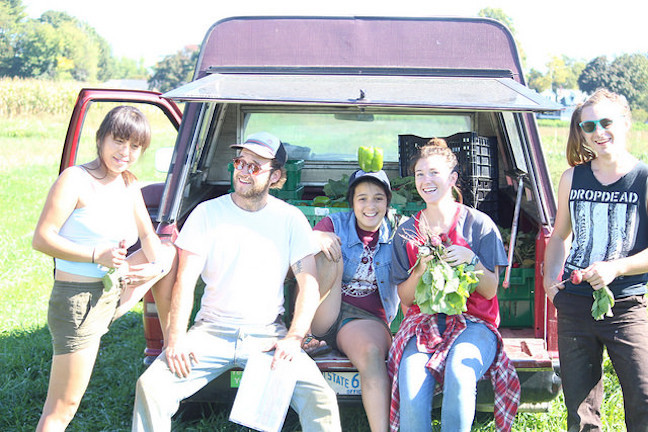UMass student farmers combat drought
"This has been an exceptionally difficult season."
November 2, 2016
AMHERST — Sitting in a loud, rusty old pickup truck UMass student farmers Cody Berman, Sarah Visnick, Erik Cullen, and Rena Frank are using crates as seats and preparing to harvest over 100 pounds of turnips, peppers, and eggplant. Located just minutes north of the campus the UMass student farm is run by Stockbridge students. The farm supplies produce for the Community Supported Agriculture (CSA) market on campus, Big Y markets in Amherst, Northampton, and Greenfield, along with UMass Dining Services.
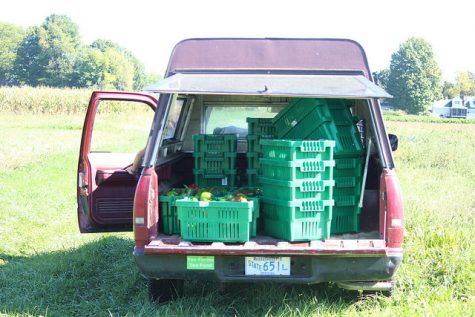
Since mid 2016, Massachusetts has suffered from a drought causing economic and agricultural distress across the commonwealth. The UMass community has not seen a drought this devastating since 1980 when the university decided to send students home for three days. To combat the drought farmers have had to work overtime, even planting certain crops multiple times to get them to germinate. It has not been an easy fight for the students as the lack of rain has destroyed vital crops such as carrots, and cucumbers.
“It was really hard to start off the season,” Visnick said. “We had to start a lot of crops over again which is really expensive.”
The cost to replace crops depends on the cost of labor to re-lay all the seeds that failed to grow. In some cases, the farmers had to re-lay seeds up to six times for one individual crop.
“It’s something that we’d like to only have to do once, but then you’re back re-laying seed again,” Cullen said.
Carrots, cucumbers, and dry beans are some of the produce affected because of the timing of the rain. Plants like dry beans that adapted to the climate became over flooded when it rained for a few days in a row.
Other local farms have been hit worse by the drought, having to give up on entire crops for the season.
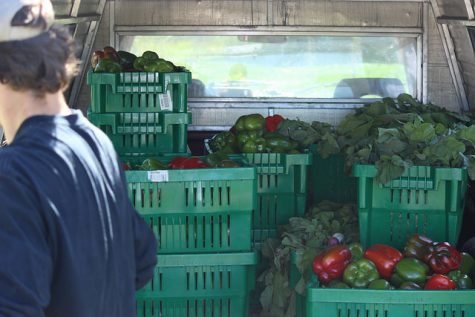
“I have a friend who works at Kitchen Garden and they just don’t have carrots this year,” Berman said.
In a four row bed, 450 feet long, the students were lucky to yield one pound of carrots per foot, according to student farmer Will O’Meara. On the wholesale market, those carrots will go for a little under $2 a pound — resulting in thousands of dollars lost for the farm.
One of the ways the farm is able to make up the difference is through the Community Supported Agriculture (CSA) market the farmers hold every Friday on Goodell Lawn on the UMass campus. By paying for their produce up front and not at the counter, CSA members take the risk of a low crop yield.
“The CSA provides some insurance against different environmental challenges like a drought,” O’Meara said. “People pay upfront for their food so we have that income regardless of what we produce.”
CSA customers understand the risk that comes with buying the $350 membership — which consists of a $150 deposit and another $200 fee. By doing so they are the largest source of income for the farm beating out three local Big Y supermarkets.
In Massachusetts, the drought has affected all 14 counties. Last month, the USDA announced that all of Massachusetts is a natural disaster area. Without access to reliable water sources, the farmers are at the hands of mother nature. No more so than in western Massachusetts which accounts for $492 million annually for the state. The city of Amherst has also issued a town-wide water ban.
Since the UMass Agricultural Learning Center is a state-run farm, it does not have to abide by the ban. Meanwhile, local farmers have had to find new resources to stay on track. Farmers have even had to resort to looking for new rivers to pull water from. In some cases, farmers’ wells have dried completely.
“We’re lucky because we’re on the city water and we’re able to use that unrestrictedly because we’re a state institution,” Visnick said. “A lot of the rivers have been running really low.”
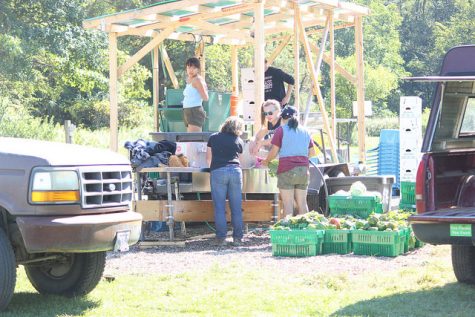
One way farmers are combating the drought is by laying down more drip line. The drip line is an irrigation technique that delivers water right to the root of the plant. This allows water to seep into the soil one drop at a time. Although the student farmers have laid “drip” down before, in these conditions they have had work drip line into a majority of their crops.
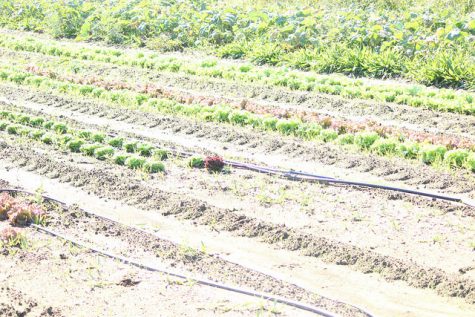
As a purchaser, the Dining Commons has started an initiative to buy some of their “second quality produce.” The food is still good to eat, but since it is not aesthetically pleasing it cannot be sold.
“They’re still completely edible they just aren’t marketable on the wholesale level,” O’Meara said. “Which is fine because we still get income from those.”
Depending on the crop, yields are down up to 50% forcing some farmers of business. As a way to help farmers stay afloat the state is giving loans to local farms and small businesses.
Droughts work in cyclical patterns, as this one ends it’s only a matter of time before farmers are faced with more extreme conditions. The UMass farmers feel lucky they were able to make it through this summer but they understand the challenges farmers will face as climate change becomes more of a factor in the future.
“This has been an exceptionally difficult season,” Cullen said. “I think we’ve come out of it really well.”
Editor’s note: This story has been updated to reflect the correct cost of a CSA membership.
Email Thomas at thannigan@umass.edu or follow him on Twitter @thannigan332.
